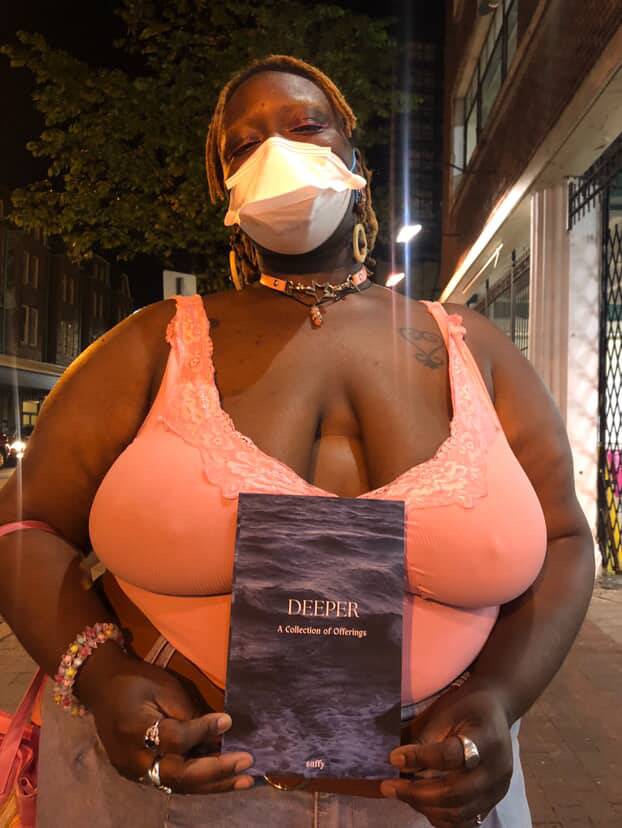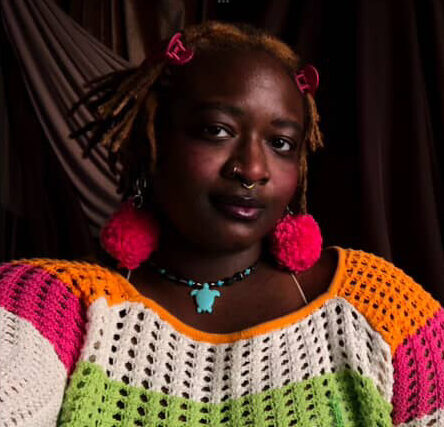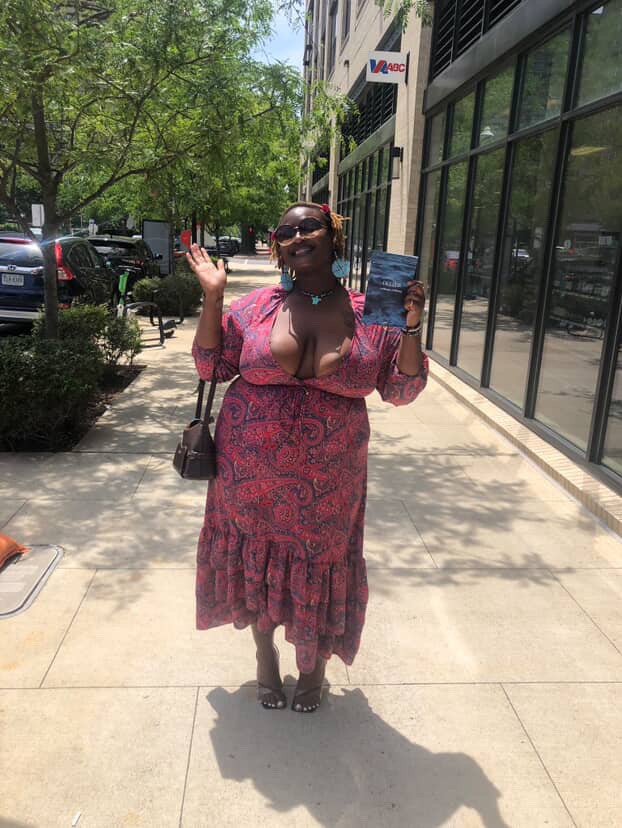The Village
A Conversation with Saffy Osei on Deeper: A Collection of Offerings
By Sophie Koutsoftas
My first introduction to Saffy Osei as a writer was their piece Love Letter to Saffy written for Issue 18 of Ebony Tomatoes Collective. Simply put, Love Letter to Saffy was a call to remember and embrace who you are, no matter what. This sentiment carries over to the pieces in their debut collection, Deeper: A Collection of Offerings.
This collection explores self love, desire, and acceptance, while offering a glimpse into the kind of world that can be created through hope.
Sophie: So Saffy, How did this collection, Deeper: A Collection of Offerings get started?
Saffy: I wanted to craft it in a way to tell the story of who I am. I have always considered myself to be a writer. I participated in poetry competitions in middle school, and started my own column for the student newspaper. I was a sociology major. Writing back then, it helped to release some anger. In senior year, at the height of the pandemic, there was a sense of confusion and distrust of our government and distrust in each other.
Having a pre-med/public health background, [I wondered] “How can I take a step back from the science side and be more intentional with the human side?” That’s when I started to write more personal essays. That’s how this memoir began.

Saffy Osei with a copy of Deeper
Sophie: Two of the biggest throughlines in this collection are the body series and food. How has food played a role in your creative process? How have you drawn inspiration from it?
Saffy: My relationship is nuanced. Writing Hunger, I finally recognized my relationship to food is disordered. I have a lot of Southern relatives and food is such a huge part of our connection. All of my favorite foods were mostly eaten at holiday times and I associate them with those tender moments with my family. A lot of my family is fat and the way they spoke about themselves, it was complicated. We talk about loving ourselves, but there is pain and suffering when you are fat in a society that is not made for fat people.
Sophie: It might be like picking a favorite child, but is there a piece that you feel the most proud of? One that you might feel the most connected to? Maybe one that was the hardest to write?
Saffy: I would say the hardest to write was the Body Series as a bulk, in which I wrote poems for different parts of the body. It took one year to write 13 pieces. I have this body that does a lot for me, and people desire this body, but it was hard to find my own desire for this body. What does this part do for you? How does this make me feel? It was hard, but I’m glad I did it.
My favorite would be MPH (Body Series 3: Mind, Pussy, Heart). It’s my love letter to femmes and lesbians, in a more sexual way. Something I love about these pieces is that they are a way to objectify your own body as a way to explore your own sexuality and sensuality without shame.
Sophie: Speaking of the Body Series, I was struck by a line in Body Series 4: Skin, “But what can you offer me that I cannot acquire myself? WHAT HAVE YOU SHED? How does it taste to free yourself?” Saffy, what have you shed?
Saffy: During that time, I had a lot of shifts happening in my relationships. Megan thee Stallion had dropped “HISS,” and I was thinking about the imagery of snakes. I was losing a lot of friends. I was no longer in alignment with my inner circle. I was thinking, I’m around people who I don’t think love me and who I am. It was a hard situation, but I am grateful for shedding that and learning to value myself for who I am.

Saffy Osei
Sophie: There are a lot of references to being reborn and remade anew. How has writing this collection given you rebirth?
Saffy: It’s the feeling of being born, but also a returning to self. At my core, I’ve been nurturing my inner child. Giving myself time and space to enjoy things again. It’s a step back into what it’s like being a child. Being a child is really hard because it’s hard to feel like you’re in control. There is a resilience in knowing how to respond to that feeling of being out of control.
Stepping back into what it’s like to be a child, being a kid, is really hard. Hard to feel like you’re in control, [and] releasing this feeling of needing to be in control of everything. Part of being resilient is knowing how to respond to it.
Sophie: While very clearly inspired by personal experience, is there any media that also inspired you for this collection?
Saffy: I have to give huge props to Akwake Emezi and their work Freshwater and Dear Sintheron, two books that really talk a lot about being multiple, being many, in one vessel. Those are books that I really needed to know that I’m not alone in feeling too big for my body, but also very small in the grand scheme of things. Those books pushed me into being a better and more sincere writer. Dear Sintheron is also a memoir, a collection of letters about doing the work you have to do because it won’t do itself, by this amazing nonbinary writer.
June Jordan has a collection of poems and is a huge inspiration for how I want to write poems. I see a kindred spirit in her. Another is Audre Lorde and the book The Wind is Spirit: The Life, Love and Legacy of Audre Lorde, an anthology and memoir written by her partner Gloria I. Joseph.
I listened to and read a lot of books while writing these pieces. I am inspired by a good friend, Olivia Miles, who went to Howard University. Ashen Remembrance is partially inspired by one of her films. I am constantly being inspired by the people in my life that create beautiful art, and by the art that I seek out. I try to pull from as many Black women and femmes as possible because they are who I’m inspired by. Also drawing on the things I like to do: video games, music, love, and being gay.
Sophie: Speaking of Ashen Remembrance, it’s a beautiful story at the end of this collection that is about two lovers who transcend time to be together. Why end the collection with this piece?
Saffy: Ashen Remembrance is a sneak peak into what I want to expand on in the future—short stories written in the same kind of universe. I want to go deeper into those characters, expand on who they are as individuals—post-fall of the empire, [and] maybe lean into solarpunk as a genre. Conflicts still arise because we are human, but I want to explore a world that has not been seen in a long time. The world under colonialism and capitalism can change.
Sophie: There is an Octavia E. Butler quote you include, “People have the right to call themselves whatever they like. That doesn’t bother me. It’s other people doing the calling that bothers me.” Can you expand on why this quote stood out to you for the collection?
Saffy: I have to name myself and I have to choose who I am and what choices I make. A lot of people struggle when it comes to power exchanges. People struggle being heard, being seen, and being understood. I am the gatekeeper of my own life and I decide what I will and will not allow. Octavia puts so much of herself into what she writes, using science fiction and fantasy to blaze this path for other Black women to see themselves in those genres. We must be true to ourselves, because we don’t know how to be anyone other than ourselves.
Sophie: What do you want people to take away from this collection?
Saffy: I really would love for people to engage with it earnestly and honestly—what sorts of things they need to shed to become more of themselves. Those who engage with my work and connect to it reminds me why I do what I do. I hope it inspires others to create stories to live in their truth. To be archivists of their own lives.

–
Saffy does go deeper with this collection. Throughout this series, you see a person interrogating their love for themselves and those around them. This inspiring collection encapsulates a journey of acceptance and triumph. We all have a unique story to tell and I cannot recommend Saffy’s enough.
To access this collection, you can get a copy at Saffy’s website and check out their Instagram for their upcoming projects. •
Edited by Ava Emilione